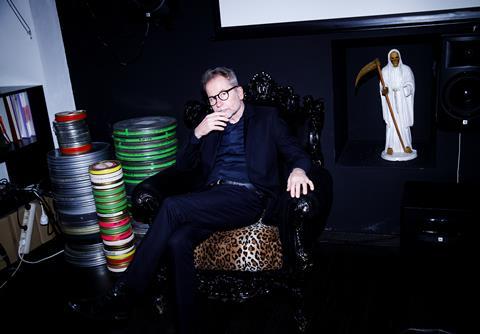Back in Berlin Competition with Rimini, Austrian filmmaker Ulrich Seidl confirms his reputation as a master of dark, comical films.

Ulrich Seidl is back in Berlin with his new feature Rimini, which is screening in Competition and sold by Coproduction Office. The maverick Austrian director is known for making dark, often morbidly funny films about subjects such as what Austrians keep in their cellars, sex tourism and safaris. While his new feature is not exactly upbeat, it has surely the most loveable protagonist in any Seidl feature — shambling, charismatic but seedy crooner and gigolo Richie Bravo (Michael Thomas). Elderly fans adore him because the music is nostalgic and sentimental, but money is tight and he has both family bereavement to deal with and an awkward relationship with daughter Tessa, who will never let him forget how badly he has neglected her.
Seidl has already shot Sparta, a companion piece to Rimini that tells the story of Richie Bravo’s equally hapless younger brother. “The other film takes place in Romania,” says the director. “In both cases, we are dealing with protagonists who are trying to escape their pasts but inevitably their past catches up with them.”
Philippe Bober and Michel Merkt, who produced Rimini, are also producing Sparta, which is in post-production. Rimini’s Berlin premiere takes place at the Berlinale Palast tonight (February 10) at 10pm.
How do you respond to critics who say your work is very dark? Is Rimini your most romantic film?
I don’t see a difference between my previous films and this one. All of my films are about unfulfilled longing; they’re about trying to show real people on screen. I think the unfulfilled longing in Rimini is just like the unfulfilled longing in the Paradise films or Dog Days. In all my films, I am trying to make films that the audience enjoy but that they also find disturbing and unsettling.

Rimini features graphic sex scenes of Richie servicing his elderly clients in bed. Were they uncomfortable to shoot?
I wanted the sex scenes to be realistic. I wanted the female protagonists to be just as important in them, to have the same weight as Richie’s character. They’re both looking for the same thing — they’re looking for satisfaction, they’re looking for happiness through sex. But for both partners, that quest is unsuccessful. It’s all about loneliness. In the end, in spite of these attempts at connection, both partners remain alone and isolated.
Viewers are likely to warm to Richie, even though he is seedy and corrupt. What are your feelings towards him?
It is very important Richie is somebody you like. It would be far less productive, far less interesting as someone doing evil who also you didn’t like. It’s very important the male and female viewers should be able to identify with him. It’s interesting the songs he sings — all these golden oldies. He sings them with absolute emotion, with absolute authenticity.
How important is it for you that your films continue to seen on the big screen?
It is extremely important and so I’m happy Rimini is being seen at the Berlinale. My films are very visual. It is very different for the viewer if they watch the films on a large screen in a cinema or on a computer screen.
Arthouse cinema has struggled during the pandemic. Do you worry about its future?
Right now, I share that concern. It is totally uncertain whether we will return to the days when people go to the cinemas to watch my kind of movie, to watch arthouse movies. In the pandemic, people withdrew. They retired into their living rooms and that’s where their lives took place. I think young people have less desire to discover these films. I hope cinema will again achieve the character of an event and that these smaller films will be seen as an event — and draw and develop younger audiences. I’m also not sure if young people who haven’t experienced cinema in the same way understand that [watching] films is not only about understanding, it’s not only following a story. Film works through our senses, through our emotions. It’s very good at that and that’s something you can only experience truly in the cinema.















![[L-R]: Amanda Villavieja, Laia Casanovas, Yasmina Praderas](https://d1nslcd7m2225b.cloudfront.net/Pictures/274x183/6/4/1/1471641_pxl_20251224_103354743_618426_crop.jpg)








![[L-R]: Amanda Villavieja, Laia Casanovas, Yasmina Praderas](https://d1nslcd7m2225b.cloudfront.net/Pictures/100x67/6/4/1/1471641_pxl_20251224_103354743_618426_crop.jpg)
No comments yet